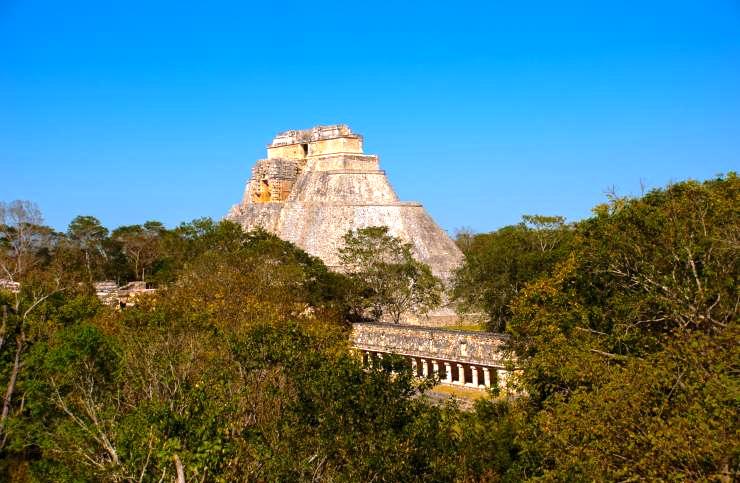The flower of Quetzal.

At that time, Prince Ulmac, ‘The One from the Water Palace’, who had ascended the throne in ‘Year Nine of the Rabbit’, reigned in Tollan. His kingdom enjoyed such prosperity that it even aroused the envy of the Rain Gods, whom one day challenged him to play a game of ball with them. The proud king accepted!
Prince Ulmac offered three precious stones he possessed and the beautiful quetzal feathers as prizes. Even the Rain Gods bet on ‘their’ precious stones and ‘their’ feathers. Prince Ulmac did not know it, but the stones and feathers of the gods were none other than the corn cobs and the leaves that enveloped them.
After the victory, when the defeated gods presented the king with simple corn cobs, Prince Ulmac flew into a rage and demanded that the pacts be fulfilled. The gods were quite surprised by the king’s reaction, but gave in to his insistence: they gave him precious stones and quetzal feathers, but demanded that the corn cobs be returned to them.
They took leave of Prince Ulmac saying: “As you see, we give you what you want. But know that from now on, for several years, you will not see a single grain of corn: for a long time, you and your people will know what famine means.”
Soon, the land over which Prince Ulmac reigned was gripped in the grip of an extremely harsh frost: the fields were scourged by terrible hailstorms. The maize disappeared: not a single cob could withstand the terrible weather. The population, decimated by cold and hunger, was unable to endure such a calamity. All the children died before they were even one year old.
Only after four years of famine did the Rain Gods feel compassion for the people. One morning a radiant sun flooded the fields tormented for so long by frost and hail.
A farmer came out of his hut and, to his amazement, saw that in the bare ground surrounding his house some corn plants were struggling to get up, loaded as they were with large cobs.
He ran home to call his wife and children, and while they were munching with incredible greed on the beautiful fruit, a shaman appeared to the man and said to him: “Take some of these ears of corn to Prince Ulmac and tell him that the Rain Gods are willing to forgive him on condition that ‘Quetzal Flower’, daughter of Tozcuecuex, of the Tenocas lineage, is sacrificed to them.
The corn that will come out of the earth, by the will of the gods, is destined for them. The kingdom of the Toltecs will, in fact, disappear.
When the message was relayed to Prince Ulmac, he was seized with great anguish: how could he ask a mother to sacrifice her eight-year-old daughter? The news of the end of his reign shocked him even more. But before the will of the gods, even the will of a prince was bound to bend. Prince Ulmac cursed in his heart the day he had accepted that damned ball challenge, but he was forced to send the Tenocas the message that came from the gods of Rain.
The mother of ‘Quetzal Flower’ absolutely would not accept what the gods had decreed. She clutched her child to her chest and locked herself in her house, never wanting to see anyone again. All the Tenoca people dressed in mourning and proclaimed four days of fasting.
Prayers and sacrifices were continuously offered in the temples. But in the end the high priest, after scrutinizing the entrails of the last llama immolated on the altar, ruled that the will of the gods had not changed: the child was to be sacrificed for the prosperity of the Tenocas.
On the day ‘Quetzal Flower’ was offered to the gods, a voice was heard speaking to her mother: ‘Tozcuecuex,’ said the Rain Gods, ‘do not weep. Your daughter will live forever with us. Her sacrifice will bring abundance to the Tenoca people’.
And so, it did. The next night, a fertilizing rain poured over the fields. The next morning, an extraordinary surprise appeared before everyone’s eyes: corn and a hundred other fruits had sprung up in the fields, and they hung ripe and abundant. No one had sown seed in the barren fields for some years. It was the ‘Year Two of the Dog’.
The blood of ‘Quetzal Flower’ had fertilized the earth. At the beginning of ‘Year One of the Flint’, there was not a single Toltec left in the entire region: an entire people had disappeared. This was the will of the gods.
In a remote cave in the Andes, Prince Ulmac spent his days in solitude. When the gods called him to their kingdom, no one down on the plain noticed. Everyone had long forgotten the famous ball game that had sealed the fate of two peoples: the Toltecs and the Tenocas.
A Mayan Myth. (Pyramid of Uxmal, an ancient Maya city of the classical period. One of the most important archaeological sites of Maya culture. Yucatan, Mexico. Photo:123rf



